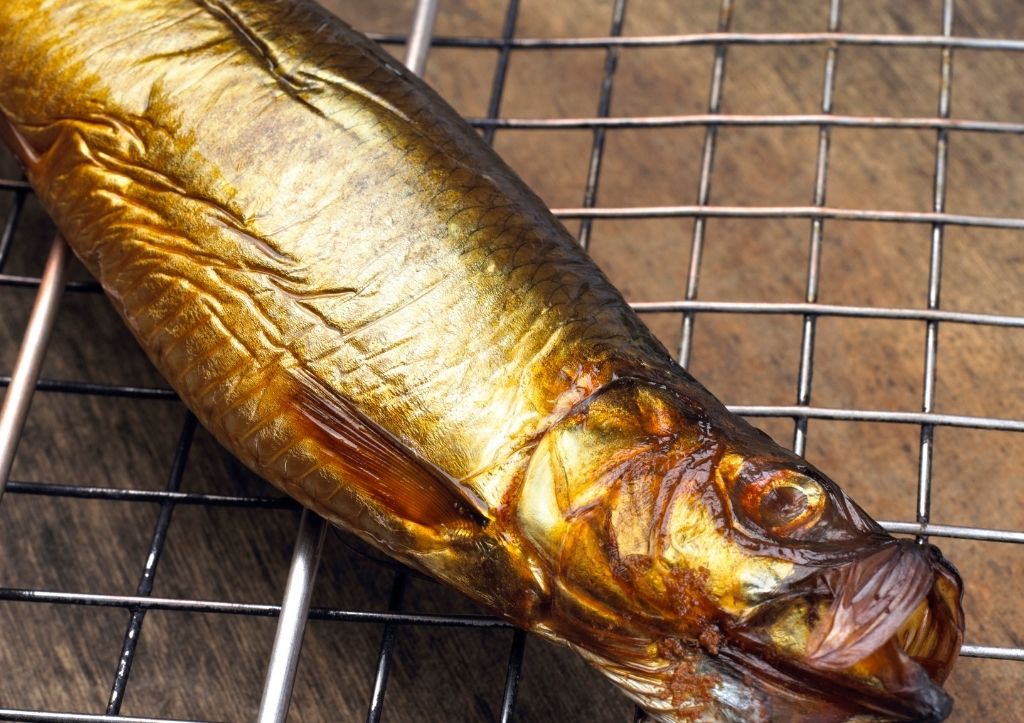Most dogs enjoy fish and kippers are no exception. They are perfectly safe for dogs to eat as long as they do not eat too many as they can be salty. Kippers also contain many great nutrients and oils that are good for dogs.
Are kippers good for dogs?
Kippers are a great treat for any dog, they contain a wider range of beneficial nutrients and are a great source of Omega 3.
This smoked fish is:
-Low in calories
-High in protein
-Is packed out with Omega 3 fatty acids
-They are also a great source of Vitamin D which will help your dog to maintain good health, strong teeth and bones and wellness.
Dogs that eat kippers will enjoy a shinier coat, healthier skin and better joint health.
If your dog enjoys fish, then kippers are a great treat for them to indulge in.
What sort of kippers should I give to my dog?
Kippers come in many different forms, but the best type to give to your dog is canned or fresh kippers.
These types of kippers have all of the bones removed so you do not have to worry about your dog choking on them.
Check before feeding that the kippers do not contain any preservatives or other additives as there are some that can be problematic for dogs.
The organic option is always best when feeding human foods to pets.
Can I give my dog kipper oil?
You should also make sure that the kippers you give to your dog are not too salty as this can cause health problems.
Yes, you can give your dog kipper oil.
Kipper oil is a great source of Omega 3 fatty acids and it can help to improve your dog’s skin health, coat condition and joint health.
You can either add kipper oil to your dog’s food or you can give it to them directly.
Make sure you only give your dog a small amount of kipper oil as too much can be harmful.

How many kippers can I give my dog?
As with all treats, you should moderation when giving your dog kipper.
Too many kippers can cause health problems such as obesity and gastrointestinal problems.
A good rule of thumb is to give your dog no more than one kipper per day.
If your dog enjoys fish, then you can gradually increase the number of kippers that they eat per day.
Just make sure you keep an eye on their weight and health so that they stay in top condition.
How should I feed kippers to my dog?
There are a few different ways that you can feed kippers to your dog.
If the kippers seem to be salty then it’s a good idea to put them into a sieve or colander and to rinse them under a cold water tap to try and remove some of the salt from the fish before feeding.
The most common way is to give them the kippers whole as most dogs will simply take them directly from the hand and you can feed them whole or chopped up, whichever you prefer.
If you are feeding kippers as an extra to his daily food then you should reduce the amount of food that you feed and you can simply mix the kippers into his dish.
If you are giving your dog canned or fresh kippers, then you can simply feed them to your dog as they are.
You can also give your dog kipper oil, either by adding it to their food or giving it to them directly.

What are the benefits of feeding kippers to my dog?
There are a number of benefits to feeding your dog kippers.
-Kippers are a great source of protein which is essential for dogs and helps to build and repair muscles.
-They are also a great source of Omega 3 fatty acids which can help to improve your dog’s skin health, coat condition and joint health.
-Kippers are low in calories which makes them a great treat for dogs that are trying to lose weight or maintain their weight.
-Kippers are also a good source of Vitamin D which is essential for dogs and helps to keep their bones and teeth healthy.
Feeding your dog kippers is a great way to give them a healthy treat that they will enjoy.
THINGS TO CONSIDER WHEN FEEDING KIPPERS TO DOGS
Feeding kippers (smoked herring) or any other fish to dogs can be safe in moderation, but there are several important points to consider to ensure that it is done in a healthy and safe manner.
Here’s a list of considerations:
General Considerations
Moderation is Key:
Only feed kippers as an occasional treat.
Bone Consideration:
Ensure that the kippers are boneless to prevent choking or internal damage.
Size Appropriateness:
Cut or break the kippers into appropriately sized pieces for your dog’s size and breed.
Nutritional Aspects
Salt Content:
Be mindful of the high salt content in smoked fish, which can be harmful to dogs in large amounts.
Fat Content:
Consider the fat content, as high-fat foods can lead to pancreatitis in dogs.
Allergies and Sensitivities:
Be aware of any potential fish allergies or sensitivities your dog may have.
Preparation and Storage
Cooking Method:
Ensure the kippers are cooked without added oils, spices, or other ingredients that may be harmful to dogs.
Storage:
Store any uneaten kippers in the fridge and ensure they are used within a safe timeframe to prevent spoilage.
Health and Safety
Choking Hazards:
Always supervise your dog while they are eating to prevent choking.
Veterinary Advice:
Consult with your veterinarian before introducing new foods into your dog’s diet.
Avoiding Spoiled Fish:
Ensure the kippers are fresh and safe for consumption to avoid food poisoning.
Behavioural Aspects
Reward and Training:
Use kippers sparingly as a high-value reward during training sessions.
Consistency in Diet:
Maintain a consistent diet and introduce new foods gradually to avoid digestive upset.
Environmental and Ethical Considerations
Sustainable Sourcing:
Consider sourcing kippers from suppliers who adhere to sustainable fishing practices.
Ethical Considerations:
Be mindful of the environmental impact of fish consumption and choose ethically sourced products when possible.
Alternative Options
Healthy Alternatives:
Consider other healthy treat alternatives that might be lower in salt and fat.
Homemade Treats:
Explore making homemade dog treats that are tailored to your dog’s dietary needs and preferences.
Monitoring and Adjustment
Monitor for Adverse Reactions:
Keep an eye on your dog for any signs of adverse reactions or digestive issues following consumption.
Adjust Portions:
Adjust portion sizes and frequency based on your dog’s age, size, and overall health.
FAQs
Is it safe for dogs to eat kippers?
Yes, it’s generally safe for dogs to eat kippers, as long as they are prepared properly. However, kippers are often processed with heavy salting, smoking, and sometimes additives that aren’t beneficial for dogs. If you plan to feed your dog kippers, look for unsalted, unsmoked options without additives. Always check with your vet first, as each dog’s nutritional needs and tolerances vary.
What precautions should I take when feeding my dog kippers?
Firstly, ensure that the kippers are boneless, as small fish bones can pose a choking hazard or cause internal damage. Secondly, kippers should be cooked to kill any potential parasites. Lastly, kippers should be served in moderation, as their high fat content can contribute to weight gain or pancreatitis.
Can kippers be a part of my dog’s regular diet?
Kippers can be a part of your dog’s diet but should not be the mainstay. They are high in protein and Omega-3 fatty acids, but also high in sodium and fats. A balanced diet for dogs typically consists of a mix of proteins, vegetables, and grains, and a small amount of fish like kippers can be a part of this mix. Always consult with your veterinarian for advice on your dog’s specific dietary needs.
Final words
Like most fish, kippers are a great treat for dogs who love the smell, taste and texture of this healthy, smoked fish.
You should only feed fresh kippers that contain no additives and always feed in moderation as they can be salty.
Like all things, if you have any concerns about your dog’s diet and what to feed, you should consult your vet to get their professional advice and opinion.




